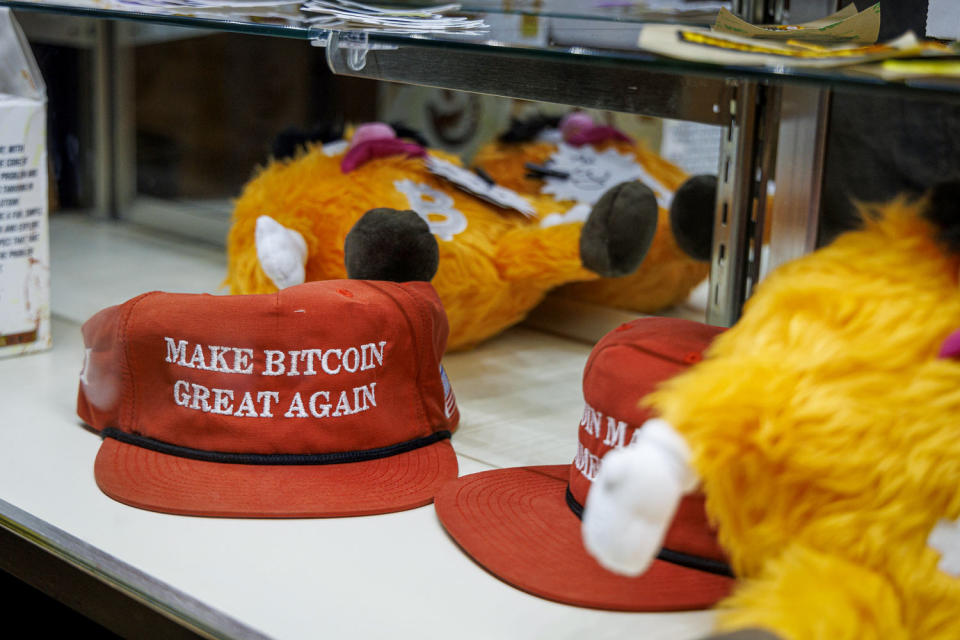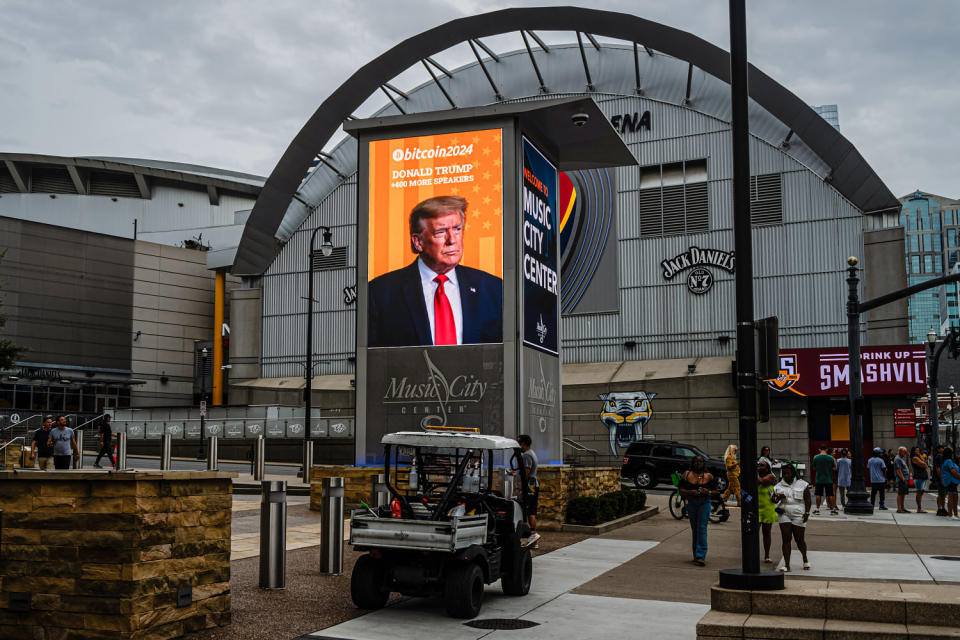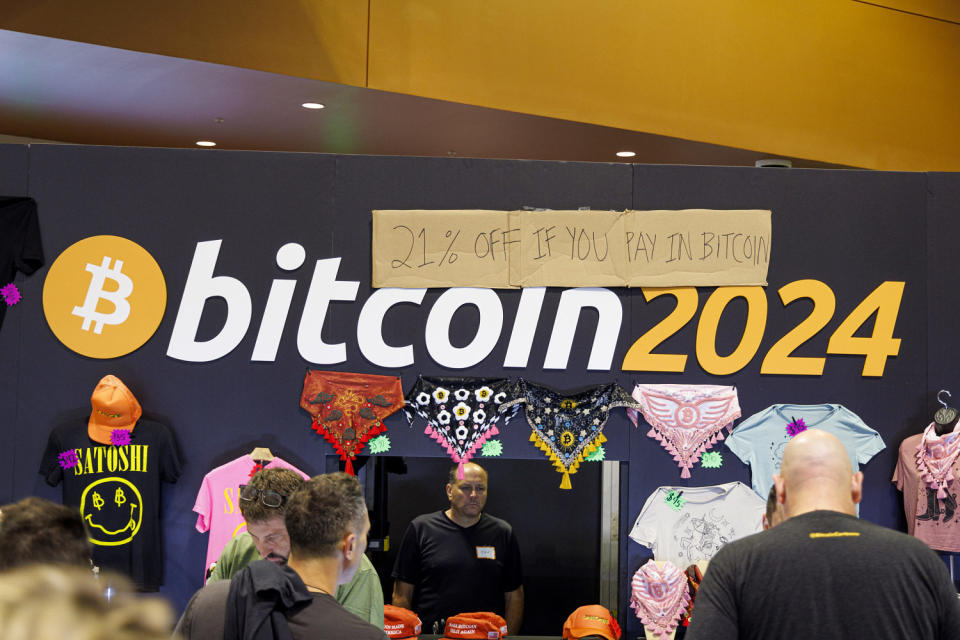NASHVILLE, Tenn. — Republican presidential nominee Donald Trump promised to make America the world leader in bitcoin and other digital currencies if elected, likening the crypto-verse to “the steel industry of 100 years ago.”
Speaking at the annual Bitcoin Conference in Nashville, Tennessee, to a standing-room-only crowd, Trump promised to ensure America becomes “the crypto capital of the planet and bitcoin superpower of the world.”
Trump painted himself as a crypto advocate in contrast to the Biden administration and other Democrats, who he said had proven unfriendly to their cause.
Trump said — to rapturous applause from the Nashville crowd — that if elected, he would fire current Securities and Exchange Commission Chair Gary Gensler, whom the crypto world has come to view as its chief opponent in government due to his agency’s rulings on digital tokens and lawsuits against bitcoin exchanges.
“I will appoint an SEC chair who will build the future, not block the future,” Trump said.
His embrace of crypto comes amid high-profile endorsements from bitcoin advocates including Tesla CEO Elon Musk and Cameron and Tyler Winklevoss, the twin brothers best known for suing Mark Zuckerberg over the creation of Facebook and who founded the Gemini cryptocurrency exchange.
Trump’s remarks stand to further cement his growing alliance with other right-leaning figures in the tech world, though the novelty of his appearance at the conference was not lost on him. As he praised the audience as “geniuses,” he acknowledged he was still learning about crypto.
“Most people have no idea what the hell it is,” he quipped. “So what happens when everyone figures it out? That’ll be something.”
Trump offered up a proposal to create a national bitcoin “stockpile” that he said would serve as a “permanent national asset,” though stopped short of offering many details.
The idea of creating a strategic crypto reserve has caught on quickly among bitcoin supporters. On Friday, independent presidential candidate Robert F. Kennedy Jr. also proposed creating a bitcoin reserve, saying he would direct the Treasury to purchase 4 million bitcoins, which in today’s prices would equate to approximately $272 billion.
Immediately following Trump’s remarks, Sen. Cynthia Lummis, R-Wyo., said she would introduce a bill to create the reserve.
However, the price of bitcoin fell slightly in the wake of Trump’s remarks Saturday, perhaps reflecting crypto traders’ unmet expectations for a more definitive commitment on the reserve idea from the presidential candidate.


While the Bitcoin Conference is officially apolitical, Trump’s speech punctuated an event whose politico panelists leaned Republican, including four sitting GOP senators and three GOP Senate candidates.
The sole elected Democrat, California Rep. Ro Khanna, spoke early Saturday and criticized the tendency within his own party to further entrench traditional centers of finance.
“I thought the Democrats were opposed to monopoly power. … We don’t want the banks and the Fed to have a monopoly on fast payments,” Khanna said at a panel Saturday.
Shortly after his morning remarks, Bitcoin Magazine reported that a group of Democratic representatives and candidates had sent a letter to the Democratic National Committee urging party leaders to be more supportive of crypto.
In addition to Khanna, the letter’s signatories included representatives in purple districts in critical swing states like North Carolina and Arizona.
The current administration’s “hostility,” the signees said, does not reflect “our Party’s progressive, forward-looking, and inclusive values.”
“A refreshed leader of the ticket represents an opportunity to change that perception,” they wrote.
In a follow-up interview with NBC News at the conference, Khanna said that positively engaging with the crypto community would be in keeping with Democrats’ desire to be “the party of the future.”
“They’re passionate, they’re active on social media, and they’re mobilized,” Khanna said. “And it’s a community that’s going to vote.”


Conference organizers say Democratic presidential candidate Kamala Harris declined an invitation to appear at the conference. The organizers declined to comment further on the matter, though conference head David Bailey criticized Harris’ absence on X. Harris’ campaign has not commented.
In an interview with NBC News on Friday, Bailey said that despite Harris not appearing at the conference, the window had not closed on Democrats’ ability to win support from the crypto community.
“There’s a whole progressive case for bitcoin,” he said. While that rationale may not have received as much notice, Bailey said, “my intuition is, over the next four years, it will.”
On Saturday, the Financial Times reported Harris had approached top crypto companies seeking a “reset” of relations, citing unnamed sources.


Bailey said it would ultimately become a political necessity for all political parties to engage with bitcoin supporters as a political bloc.
“It’s not too late — in fact, everyone will have to come to terms with it,” he said. “They won’t be viable otherwise.”
Outside the conference early Saturday, pro-Trump bitcoin supporters made their presence known.
Chad Kozman, an Ohio resident, sported a “Free Ross/Vote Trump” shirt, referring to the community’s desire to see Silk Road founder Ross Ulbricht’s life sentence on drug and money-laundering charges commuted, something Trump has promised he would do.
Kozman told NBC News that while Trump’s overtures to the crypto community were opportunistic, it was also a sign that the community had matured beyond its individualistic roots into a voting group that had to be reckoned with.
“For the bitcoin community, it’s been a really hard road to get people to see the benefits of collectivization and pulling together,” he said.
This article was originally published on NBCNews.com
